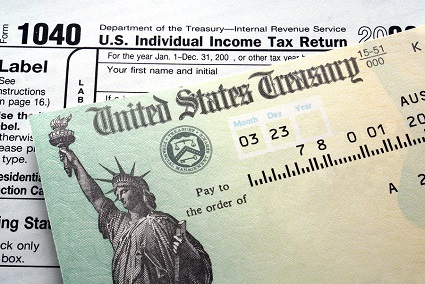When Pres. Donald Trump signed the Tax Cuts and Jobs Act into law in December of last year, he altered the tax benefits of owning a home and paying down a mortgage.
But those changes? They won’t impact the 2017 income taxes that you must file by April 18. Instead, they’ll take effect next April for the 2018 tax year.
So what tax benefits of owning a home are still in play? Many. Here’s a quick list:
Mortgage interest deductions
Priya Mishra, managing attorney at Top Tax Defenders, a back-tax resolution firm based in Houston, said that despite the changes enacted in the Tax Cuts and Jobs Act last year, owning a home still provides valuable tax breaks.

But you won't be able to take advantage of them if you don't itemize your taxes.
As Mishra says, the biggest tax break for most homeowners remains the mortgage interest deduction. Tax reform legislation doesn't change this.
Mishra said that owners can still deduct the interest they pay on up to $1 million of mortgage debt used to buy or improve a first or second home. Single taxpayers or those who are married by are filing separately can deduct the interest they pay on up to $500,000 of mortgage debt used for the same purposes.
As an example: If you are married and filing jointly and you have a mortgage of $1.2 million, you can only deduct the interest you paid on $1 million of that loan. If you are married, filing jointly and have a mortgage of $500,000, you can deduct all the interest you paid on that loan during 2017.
This will change slightly when you file your taxes next year. Starting in the 2018 tax year, you can only deduct interest on up to $750,000 of mortgage debt.
Priya, though, does remind homeowners that they can only take these deductions by itemizing their taxes on Schedule A. This means that taking the deduction might not make financial sense for some homeowners. The standard deduction for single taxpayers and married couples filing separately is $6,350 for 2017. For married couples filing jointly, that standard deduction is $12,700.
If the money you'd save through the standard deduction is more than what you'd save by itemizing your taxes, you won't be claiming that mortgage interest deduction. You can't itemize if you choose the standard deduction.
More homeowners will probably forego the mortgage interest deduction when they file their 2018 taxes next year. That's because under the tax reform legislation, the standard deduction for the 2018 tax year will rise to $12,000 for single taxpayers or taxpayers who are married but filing separately. For married taxpayers filing jointly, the standard deduction will jump to $24,000.
These higher standard deductions mean that it will sense for a smaller number of taxpayers to itemize starting with 2018 taxes. More taxpayers, then, will claim the standard deduction and skip the mortgage deduction.
Home equity loan interest deduction
When the tax reform legislation first became law, there was plenty of confusion surrounding home equity loans. Many wondered if the legislation forbade homeowners from deducting the interest they paid on home equity loans in all situation.

Turns out, it didn’t. Josh Zimmelman, owner of Westwood Tax & Consulting in New York City, said that the new legislation says that homeowners can still deduct the interest they pay on home equity loans if they use those loans to fund improvements that boost the value of their home or allow them to purchase a second home.
Zimmelman said that starting with the 2018 tax year, owners can no longer deduct the interest they pay on home equity loans if they are using those loans for any other purpose, such as paying down credit card debt or helping to pay for a child's college tuition.
This year, then, you can still deduct the interest you pay on up to $100,000 of home equity debt, Zimmelman said. As with the interest deduction on a primary mortgage, you will have to itemize if you want to claim this deduction. Again, you can’t claim both this deduction and the standard deduction.
Property taxes
For your 2017 taxes, you can still deduct the full amount of property taxes that you paid during the year. Again, you’ll have to itemize your taxes to claim this deduction.
The Tax Cuts and Jobs Act, though, does change this starting with the 2018 tax year. When you file your taxes next year, you can only deduct up to $10,000 worth of property taxes. If you pay $15,000 in property taxes, then, you won’t be able to deduct that extra $5,000.
Private mortgage insurance
If you don’t have at least 20 percent equity in your home and you have a conventional mortgage – one not insured by the federal government -- you’ll have to pay private mortgage insurance. If you take out a loan insured by the Federal Housing Administration, you’ll have to again pay for mortgage insurance, though with an FHA mortgage it is known as FHA Mortgage Insurance Premiums.
This type of insurance does not protect you. Instead, it protects mortgage lenders in case you fail to make your mortgage payments.
Brian Ashcraft, corporate regional director with Virginia Beach, Virginia-based Liberty Tax Service, said that homeowners who are paying mortgage insurance can deduct their payments on their 2017 taxes. But there’s no guarantee that the deduction will remain in 2019 when they file their 2018 taxes.
“This deduction had expired in 2017, but the budget deal resurrected it and made it retroactive for 2017,” Ashcraft said. “It has not been determined if the deduction will be available in the future.”
Energy-efficiency upgrades
Ashcraft said that homeowners can claim a property tax credit if they installed energy-efficient windows, doors, insulation or other products in their homes. Homeowners can qualify for a tax credit of up to 10 percent of the cost of these energy-efficient improvements, up to a maximum of $500.
That $500, by the way, is a lifetime limit. If you claimed $500 when filing your taxes last year, you can’t do it again this year.
This credit, too, was supposed to expire with the 2016 tax year, Ashcraft said. But the budget deal kept it alive for the 2017 tax year. Again, it’s unclear if this tax credit will be available when homeowners file their 2018 taxes next year.





